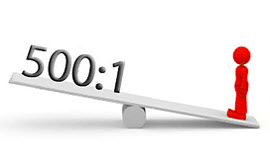You should never engage in FX trading using money that you can not afford to lose. FX trading is considered a high risk activity. It can yield great rewards, but it can also result in losing all or almost all of the invested money.
Keep your trading money separate
 Mixing your trading money with the rest of your money is risky. It is much better to have a dedicated account for trading, filled with money that you can afford to lose. You can for instance have a trading account that you refill with $500 once a month, regardless of whether a refill is needed or not. If you lose the money in your trading account, do not make an unscheduled refill.
Mixing your trading money with the rest of your money is risky. It is much better to have a dedicated account for trading, filled with money that you can afford to lose. You can for instance have a trading account that you refill with $500 once a month, regardless of whether a refill is needed or not. If you lose the money in your trading account, do not make an unscheduled refill.
You should also have rules for when you take money out of your trading account. For many FX traders, trading is a way of adding some extra cash-flow to the budget, and this can be a great thing. But you need to decide in advance when withdrawals will be made, e.g. “I will withdraw $100 from the trading account on the 1st of each month this year, provided that there is a minimum of $5,000 in the account”.
If you start treating your trading account like a piggy bank that you can rob whenever you feel like it, you will lose the recommended separation between trading money and other money. It is especially dangerous to create a habit where you haphazardly dip into your trading account to pay for important expenses such as rent, utilities and insurance, because doing this is likely to make you more okay with putting money that should be used for rent / utilities / insurance into your trading account.
Separation should work both ways. Don’t refill your trading account on a whim and don’t withdraw money from your trading account on whim. Have a strict plan in place for both deposits and withdrawals.
Be aware of the risks of leveraged forex trading
Leveraged forex trading can seem very appealing, but it does involve risking borrowed money. This means that when you engage in leveraged fx trading, you can lose much more than the money you have in your account and you risk ending up owing the broker money. The broker can decide to go after your other assets to collect the money owed, and you can end up losing real estate, savings, investments, etc.
 Not being able to pay back what you owe to the broker can put a huge dent in your credit report and ruin your credit score and this can impact many aspects of your everyday life. If you need to borrow money with a bad credit report, expect high interest rates and fees. You may even be denied credit from banks and other traditional lenders and be forced to seek out lenders specializing in clients with bad credit reports. These loans tend to be very expensive and also quite limited in size. Even if you use a comparison service such as Nyasmslån.com it can still be difficult to find a lender willing to lend you more than a pittance. Getting a loan large enough to buy a house or a nice car can become an impossible dream until you have improved your credit report.
Not being able to pay back what you owe to the broker can put a huge dent in your credit report and ruin your credit score and this can impact many aspects of your everyday life. If you need to borrow money with a bad credit report, expect high interest rates and fees. You may even be denied credit from banks and other traditional lenders and be forced to seek out lenders specializing in clients with bad credit reports. These loans tend to be very expensive and also quite limited in size. Even if you use a comparison service such as Nyasmslån.com it can still be difficult to find a lender willing to lend you more than a pittance. Getting a loan large enough to buy a house or a nice car can become an impossible dream until you have improved your credit report.
Standard fx brokers make money on each transaction (regardless of whether you gain or lose) and how much money they make will typically depend on the size of the transaction. It is therefore in their best interest to encourage you to trade large volumes, e.g. by making big individual transactions or by making a very large number of small transactions. This is the main reason why they offer leveraged trading – to make it possible for you to trade larger volumes and thus provide them with a bigger commission. You might just have $500 to deposit in your trading account, but the broker is happy to lend you $50,000 to trade with. Of course, borrowing $50,000 to trade with means that you can end up owing the broker $50,000 that must be paid back.
This article was last updated on: April 18, 2016
